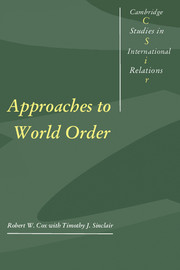Book contents
- Frontmatter
- Contents
- Preface
- Acknowledgements
- Part I Overviews
- 1 Beyond international relations theory: Robert W. Cox and approaches to world order
- 2 Influences and commitments
- Part II Theory
- Part III Interpretations
- Part IV Multilateralism
- Complete bibliography of works by Robert W. Cox to 1995
- Index of names
- Index of subjects
- CAMBRIDGE STUDIES IN INTERNATIONAL RELATIONS
2 - Influences and commitments
Published online by Cambridge University Press: 05 June 2012
- Frontmatter
- Contents
- Preface
- Acknowledgements
- Part I Overviews
- 1 Beyond international relations theory: Robert W. Cox and approaches to world order
- 2 Influences and commitments
- Part II Theory
- Part III Interpretations
- Part IV Multilateralism
- Complete bibliography of works by Robert W. Cox to 1995
- Index of names
- Index of subjects
- CAMBRIDGE STUDIES IN INTERNATIONAL RELATIONS
Summary
In a review of Production, Power, and World Order Susan Strange wrote that I am “an eccentric in the best English sense of the word, a loner, a fugitive from intellectual camps of victory, both Marxist and liberal.” The unconventionality of my intellectual journey requires some explanation for those who would want to situate what I have written in the context of my life.
Two kinds of influence are at play. There is the influence of circumstances and events personally experienced; and the influence of authors and ideas encountered. The reader will have to judge whether or not there is consistency or rational development in the sequence of my commitments.
Conservatism and social democracy
Growing up in Montreal during the 1930s and 1940s shaped my outlook. From an early age, I was inclined to see the contradictions in the values of my milieu and to challenge its orthodoxies. My family were conservatives in politics, so I began to take a critical interest in conservatism. For Anglo-Canadians of that era, conservatism was the British connection, and for Anglo-Quebecers it was also a sense of complacent, self-satisfied superiority, with regard to French (and Catholic) Quebecers. These feelings were exaggerated during World War II because of lukewarm commitment or outright opposition to the war among much of the French-speaking population. Given my disposition to question the dominant attitudes of my milieu, I devoted my research interests to French-Canadian politics, and my theoretical interests to reading some classics of conservatism.
- Type
- Chapter
- Information
- Approaches to World Order , pp. 19 - 38Publisher: Cambridge University PressPrint publication year: 1996
- 5
- Cited by

